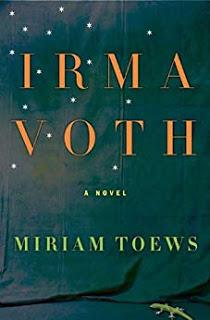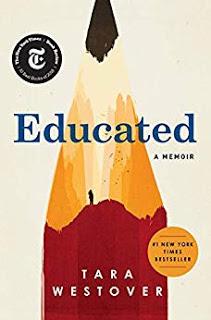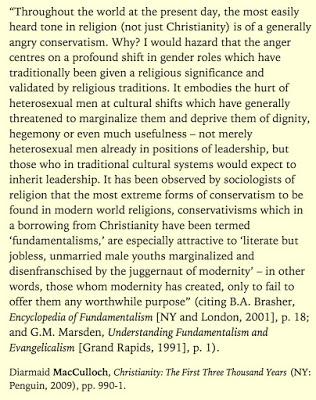

It's by accident — or synchronicity — that I happen to have read Miriam Toews' novel Irma Voth at the same time that I'm reading Tara Westover's Educated. Toews' book explores the lives of several young women and girls in a Mennonite family in Mexico, which previously had roots in Manitoba (and before that in Russia). Westover focuses on her experiences growing up in a survivalist Mormon family in Idaho.
A theme that ties these two books together in a decisive way: the overbearing, violent treatment of women dished out by men in two patriarchal, cut-off religious groups intensely suspicious of the outside world and of government, groups in which men rule the roost and can dispose of the lives of their wives and daughters as they please. I don't mean to pick on either Mormons or Mennonites in making this observation. It can apply equally well to many other religious communities. As I have shared in a previous posting mentioning Westover's book, I have encountered — close up — a Catholic version of the same phenomenon.
In that posting, I noted the anti-science, anti-conventional medicine, anti-schools, anti-government stance of these interlinked movements that cross denominational (and religious) lines. What strikes me powerfullly as I read Toews side by side with Westover is the toxic patriarchy of these groups, the abuse inflicted on women, who spend their lives — in both Westover's Mormon telling of this story and Toews' Mennonite telling of it — trying to escape from the confines that patriarchal control imposes on them, trying to find some sense of self that transcends the confines of the independent-woman-as-whore definition with which Westover contended mightily when she chose to live her own life apart from her family and religious community.
I'm speaking of women fortunate enough to escape, of course. Both Westover and Toews note that many women raised in these misogynistic patriarchal communities never have that chance, or collude in their denigration, yielding their minds, independence, futures, and very lives to the men who control them in the name of God.
Nor do I think this is a problem confined only to sectarian, cut-off religious movements. Though many liberals in the U.S. refuse to see or to admit this, religious groups that transcend the sectarian, cut-off, cultic definition of religion can and do also nurture rancid misogyny — and that rancid misogyny was on full display in the 2016 election in the U.S. It helped bring us our current president. The large majority of the white Christians who pulled the lever for Trump in that election — more than half of white Christians across the board — professed that they could not choose Hillary Clinton because they are "pro-life." But that claim enfolded (and concealed) deep distrust of women and deep suspicion that God has not ordained women to lead nations, corporations, religious groups, what have you.
The violence that runs through the stories Toews and Westover both tell, violence that grinds women down and assaults their dignity at every turn, especially insofar as they seek to move beyond the control of father and brothers: it's mind-boggling. A key motif of Toews' story (warning: this is a spoiler) is something the novel voices overtly as its eponymous character and narrator, Irma Voth, observes that her father doesn't like it when his daughters grow up. Their growing up makes him crazy (p. 203). And exceedingly violent ….
Westover's story of growing up with a father who imagined that angels were watching over him and his family as he subjected his children, and especially his daughter Tara, to one life-threatening situation after another, and with a brother who tortured her and broke her bones when she refused to bend to his will: it's deeply sobering.
In both stories, there's the long-suffering, silent mother in the background, mixing potions and doing magic tricks to enhance her potions' potency in the case of Westover's mother, or singing old Mennonite hymns in Low German quietly with her youngest children while encouraging her daughters to escape their father's violence in Toews' novel: women caught in the web of male violence and religious control, unable or unwilling to get out of the web, who still want something more for their daughters. Since, in Westover's case, her mother quietly encourages her to obtain a college education, though publicly and "officially," she agrees with her husband that education only emboldens women to be whorish and rebellious….
"I'd been wondering whether something was wrong with me since the beginning of the semester, when I'd attended my first lecture on world affairs," Westover says about herself as she moved to Brigham Young University from a world of home schooling in which she was taught nothing at all by her mother. Then: "I'd been wondering how I could be a woman and yet be drawn to unwomanly things" (p. 229).
The "unwomanly thing" to which she was drawn: she was asking herself why it was that she had slotted herself to study music, a discipline suitable to a woman, while a male classmate she knew was determined to go to law school. When she discussed this with him, he assured her that women should not seek to be lawyers, since women are made different from men and do not aspire to manly professions like that. Women want children and family — and music adorns a family and makes life comfortable for the hard-working, bread-winning man of the family (p. 229).
How can democratic societies sustain themselves, I ask myself as I read these two books side by side — how can they sustain themselves when they place themselves more and more in the control of those who choose ignorance and religious superstition, who scorn education, who eschew the common good and actively attack structures designed to serve the common good, all because they imagine God is driving them to adopt such stances? More people buy into this nonsense than many liberal thinkers want to imagine, and these folks are on the cusp of gaining the upper hand in American society, if they have not already done so via the election of Donald Trump in 2016.
I return to that quote from Diarmaid MacCulloch's Christianity: the First Three Thousand Years that I've shared over and over on this blog since I read MacCulloch's book a few years back:


